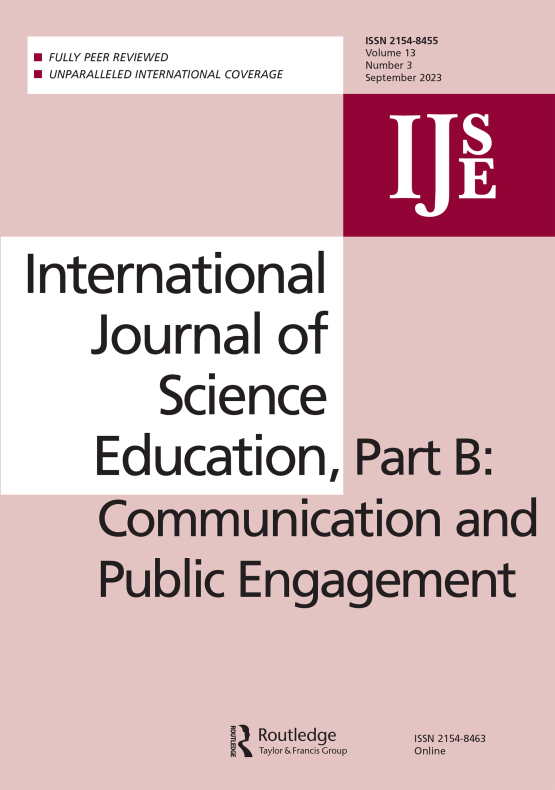Submit a Manuscript to the Journal
International Journal of Science Education, Part B
For a Special Issue on
Engaging young people in authentic research - Citizen & Community Science and its potential for primary, secondary and informal science education
Abstract deadline
01 December 2023
Manuscript deadline
31 May 2024

Special Issue Editor(s)
Julia Lorke,
RWTH Aachen University, Germany
[email protected]
Claire Ramjan,
University of Stirling, UK
[email protected]
Maria Aristeidou The Open University, UK,
The Open University, UK
[email protected]
Veronica Del Bianco,
Loyola University New Orleans, US
[email protected]
Laure Kloetzer,
University of Neuchâtel, Switzerland
[email protected]
Per Hetland,
University of Oslo, Norway
[email protected]
Engaging young people in authentic research - Citizen & Community Science and its potential for primary, secondary and informal science education
The number of Citizen and Community Science projects has been increasing over the last decade, many of them including or specifically addressing young people (children and youth up to the age of 24). Engaging the public in authentic research has gained attention in scientific and education research, science communication and science education practices. Remarkably, even the science policy sector has begun endorsing Citizen and Community Science owing to their seamless alignment with prevailing policy frameworks, such as the Open Science or Responsible Research and Innovation framework, exemplified prominently within the European Union and the Crowdsourcing and Citizen Science Act of 2016 in the United States.
A growing number of studies on Citizen and Community Science have shown promising results regarding various learning outcomes. However, many of these studies focus only on specific projects and often solely rely on self-reported measures for their evaluation. Simultaneously, our understanding of how these outcomes are achieved during participation is still limited. The field currently lacks a comprehensive understanding of the demographics of young people who participate or abstain from participating as well as the reasons that drive their choices. Approaches to foster sustained engagement or to encourage educators and teachers to implement Citizen or Community science require further investigation for long-term effects. There is also a lack of understanding regarding how participation in Citizen and Community Science can shape individual learning biographies and impact learning trajectories.
In this special issue, we seek to illuminate current issues and trends regarding the design and implementation of Citizen and Community Science projects with young people in primary, secondary education and informal learning settings, as well as youth participant outcomes. We invite papers that address the following questions:
- What learning outcomes can be achieved through Citizen and Community Science participation, especially across different projects? How are these outcomes achieved and how can they be measured?
- What does participation in Citizen and Community Science entail? What kind of learning opportunities are offered through design and facilitation that foster learning?
- What role does Citizen and Community Science participation play in individual learning biographies, pathways and identity work?
- Who participates in Citizen and Community Science, and how can we reach currently excluded audiences? What factors influence participation or non-participation?
- Whose voices, interests and needs are represented in initiatives to engage young people in Citizen and Community Science?
- To what extent does training teachers or other educators affect their motivation and decisions to engage young people in Citizen and Community Science? How does it shape their implementation strategies and practices?
Looking to Publish your Research?
Find out how to publish your research open access with Taylor & Francis Group.
Choose open accessSubmission Instructions
The review process for the special issue will take place in two stages. In Stage 1, potential authors will submit an extended abstract outlining key ideas of the proposed manuscript, including the manuscript’s approach (e.g., conceptual, philosophical, historical, empirical) research questions, methods, main findings and contributions. This extended abstract should not exceed 500 words and needs to include up to three keywords. The guest editors will review the extended abstracts to invite full manuscript submissions based on the potential of proposed manuscripts to offer insights on engaging young people in Citizen and Community science. The submission of extended abstract and all queries should be addressed to Julia Lorke ([email protected]).
In Stage 2, invited manuscripts will go through a double-blind review process using the same standards and evaluation criteria as all manuscripts submitted to the International Journal of Science Education, Part B: Communication and Public Engagement. Manuscripts should not exceed 8,500 words in length, inclusive of tables, references and captions. Select "Engaging young people in authentic research - Citizen & Community Science and its potential for primary, secondary and informal science education” when submitting your paper to ScholarOne.
December 1,2023 Deadline for submission of extended abstracts
January 15, 2024 Notification of acceptance
May 31, 2024 Deadline for submission of full papers
September 30, 2024 First round of feedback on full papers
November 30, 2024 Deadline for submission of revised papers
February 28, 2025 Final decision
Mid 2025 Publication of Special Issue